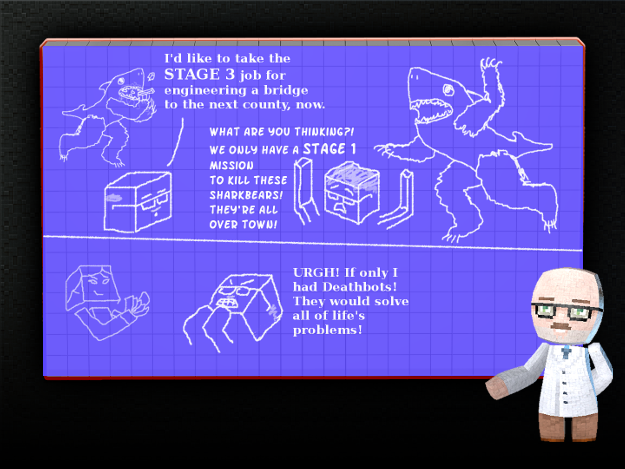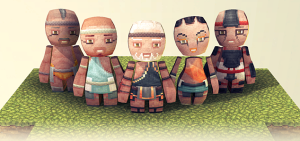This time, we go more in depth about how missions are formed in the game world. Missions are generated based upon the needs of the various factions (such as towns, nations, businesses, and families) found throughout the universe.
This Whole Setup Was Staged

“Stages” determine which missions villages will push for the player to try to take. The stages are in a hierarchy, where the lowest-numbered stages are the most critical missions to that particular faction. This means by extension that those NPCs most closely allied with the faction, and/or the faction leaders will often be much more grateful for the completion of a Stage 1 mission than they will for the completion of a Stage 4 mission. Players that satisfy all the stage 1 mission needs will have the higher-number stage missions appear, but a far-thinking or just plain devious player may be able to find a way to cause a problem they can then solve for extra gratitude. (Encouraging dangerous creatures to set up lairs near town, just so you can charge for their extermination later. Causing food shortages so you can sell your own crops at a premium…) Just don’t get caught actually causing that problem. Players that create a stone quarry through a bit of excavation and finding a good resource location, meanwhile, can create the missions relating to the needs of a village to exploit that resource without risking their reputation.
As discussed in the “Factions” article, however, missions are not given out by just towns, alone. Each faction may have missions to give out, and doing missions for different factions gets you different reputations. The mayor may post help wanted missions to make sure the town doesn’t go without critical resources or to exterminate dangerous creature lairs popping up too close to town for safety, but a local influential family may want to undermine a rival family. A merchant guild may pay for clearing a trail to the next town over, while thieves guilds may just be recruiting to steal enough goods that their black market trade booms. What may be low-priority for one faction is high-priority or not a priority for another. (The village may care slightly about a road to another town, but merchants care very deeply about having their trade lanes open.) Rival factions (like a group of bandits versus the local soldiery) may outright have opposing priorities.
Stage 1: Immediate Survival
These are the most obvious, immediate, and most critical of all missions. “The town will starve if we don’t get more food!” or “AHHH! Rabid wild landsharks are eating my legs!” or “We’re running low on coffee and tea!! We’ll all surely die!” These are the highest-priority missions, and are triggered by an actual critical shortfall in the simulation. Needless to say, when an existential crisis like monsters actually being inside the town, eating townspeople is happening, few townspeople are willing to worry about lower-priority missions. If things get too serious, the villagers may just pack up and leave (or die) and won’t be available for missions any longer.
For non-town factions, this may mean situations that threaten the existence of the faction. A powerful family faction may find its patriarch/matriarch the target of an assassin. A merchant may find his business underwater if the factory can’t get needed raw materials. Thieves guilds with members turning states evidence and putting the whole guild behind bars wants the investigation (and informants) buried. Religious or political factions may be oppressed, and seek whatever methods will let them continue existing.
If an individual person’s family member is lost or kidnapped, they may think of their lost loved one as a Stage 1 mission, even if the rest of any factions they belong to don’t. Faction leaders may interpose their personal priorities over faction priorities in some cases, making an otherwise stage 4 mission into a stage 1 mission.
Stage 2: Neighbor Priorities
After the immediate survival of the village or faction is assured, villages and factions look slightly to the future, and try to solve problems that can hurt them fairly soon. This means making sure that immediately-linked neighbor villages are not in danger. The local forest logging town that supplies the city with lumber for fuel and furniture is important to keep functioning, so a threat to that town is an indirect threat to the city. “Threats” are basically Stage 1 problems in that neighboring town; Things like invasions by hostile nations trying to take the village away, or a critical food shortage.
Villages feud over control of a nearby resource flag. Merchants worry about the monsters on a path to the next town. Powerful families want to dispose of an embarrassing secret. An engineer needs help keeping monsters away from a construction site near town. Religious or political factions may want to support another cell of their faction in dire straights.
Stage 3: Nation-wide Priorities
When their more colloquial threats are quelled, villagers turn to the needs of the greater culture or nation they belong to, and other factions think about their allies. These are the short-term problems of those with whom the villages have solid alliances. These are solving problems that are somewhat remote, but which are necessary for saving face and fulfilling obligations or serious ambitions. They may also be planning for future problems.
Villages want to send troops to fight in wars with foreign powers. Villages hire adventurers to keep the nearby dangerous creatures at bay so that they aren’t a threat later. Thieves want to set up a new smuggling route. Merchants want access to new markets across dangerous or untracked sea or land. Engineers may have shortfalls in resources to build their projects.
Stage 4: Procedural Event Missions
These missions aren’t immediate problems factions create to solve direct problems the simulation says they have. They may be missions that simply advance a broad goal that a faction has. They frequently are problems that are “made up” just so that players have a mission to complete. These missions have less obvious consequences – a whole town is less likely to appear or disappear, but the missing heirloom locket you returned may still be worn by the villager you returned it to. The statue the noble commissioned from you may be on display in front of their home for generations.
Powerful families may want something done in their name to advance their political agenda… or something done without association with their name to cripple a rival. Political factions want to stage some sort of demonstration of protest. Religious factions want you to help put together a festival, or convert new members. Curious villagers may ask players to explore a dungeon they saw, and wipe out dangerous monsters or maybe retrieve an artifact they think may be inside. Villages may pay to explore and chart new lands or find new resources. Merchants hire players as engineers or architects of new stores or factories they need built.
On the “made up” side of things, players may be asked to save villagers who happen to get in trouble just for players to have a chance to save them. Wealthy villagers may commission player-made objects to give players who craft some challenges. Thieves try to hire the player for a heist. A reward is put out for bringing back rare resources, or a bounty is put on the heads of bandits or dangerous creatures. A rare heirloom is lost when a thieving animal takes it – go bring it back from its lair.
Stage 4 missions are found in much greater quantity than the other stages, making sure that players nearly always have an interesting short-term goal for their player that has in-game relevance to the wants and needs of different factions, even when the most immediate concerns are met. Eventually, they’ll run out of missions that appeal to them in a given town, but can always just move to the next town over. Just keep in mind – factions are often at odds, so you definitely won’t get far just taking every single mission you find. The consequences of being associated with a faction of brigands, political dissidents, or a powerful family about to be wiped out by their rivals can wind up doing more harm than good to your reputation with the leading powers of a town!
- Imagine Nations Team
We have posted a lot of great news in our April Monthly Update. We discuss the current state of the game and when “Backers” can expect a build. Please join the campaign and support this game.


